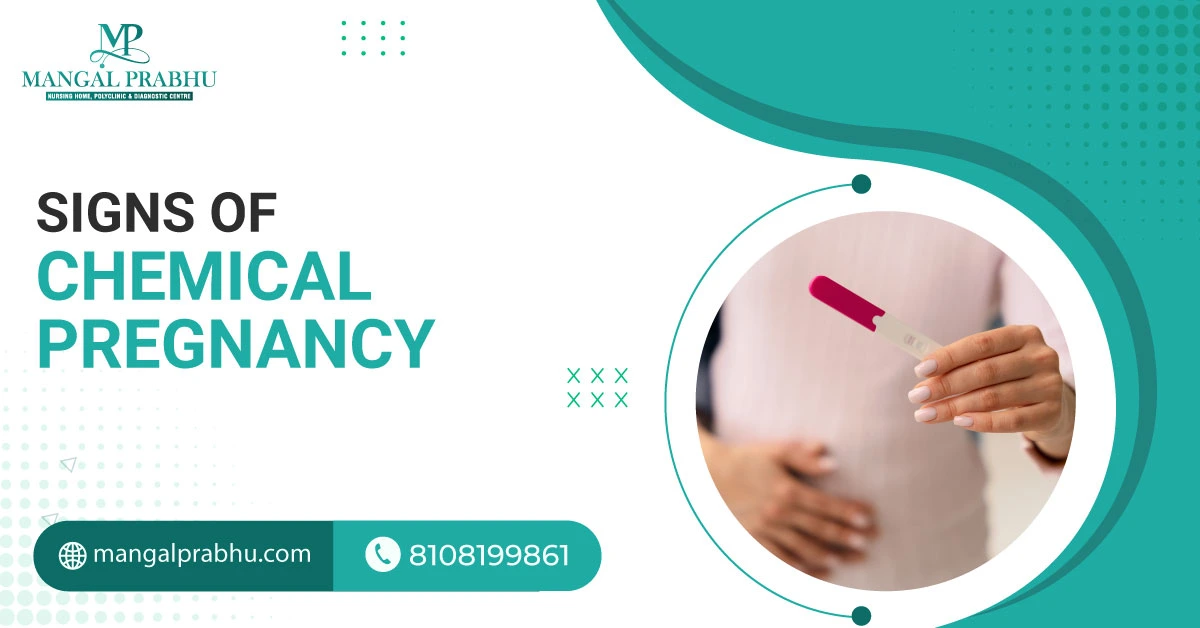
Signs of Chemical Pregnancy
Not every pregnancy is carried to term. A chemical pregnancy refers to an early miscarriage or termination of a pregnancy before five weeks. It’s so early that some women don’t even realize they are pregnant and had a miscarriage, especially if the pregnancy ends soon after the missed period. Chances are your pregnancy won’t be visible on the ultrasound.
It’s important to know the signs of chemical pregnancy and head to the nearest maternity hospital in Navi Mumbai if you experience the symptoms mentioned below:
Early Signs of Chemical Pregnancy
Chemical pregnancy can make you an emotional wreck. Having a miscarriage right after the positive pregnancy test is not just physically exhausting but is equally tough on your mental health. Here’s what to watch out for:
1) Bleeding:
It may start with spotting, which gradually develops into heavy period-like bleeding. Your period might arrive late.
2) Lower Abdominal Cramps:
When your pregnancy doesn’t progress, your body will start to shed the uterine lining, which results in mild cramping. It mimics your period cramps, so it’s often hard to tell whether it’s just the regular monthly cramps or pregnancy-loss cramps.
3) Drop in hCG Levels
Your hCG levels rise drastically in the first few weeks of your pregnancy. In the case of a chemical pregnancy, women notice faint lines on the pregnancy test, which might completely disappear as the hCG levels drop.
4) Pregnancy Test Results
The most obvious sign of a chemical pregnancy is the negative test result. If you have had a positive pregnancy test followed by a negative result, it may indicate an early pregnancy loss.
5) No Pregnancy Symptoms
For some women, pregnancy symptoms, such as nausea, vomiting, and breast tenderness, can start as early as 2-3 weeks. If you felt morning sickness, nausea, and other pregnancy-induced symptoms, which resolved suddenly, it may be a sign you have had a miscarriage.
6) Emotional Impact
For those who didn’t realize a pregnancy loss might go on to live their lives normally. Those who have taken a pregnancy test might be disheartened by a negative pregnancy report. As mentioned earlier, it can take a toll on your mental health.
However, know that it’s neither your nor your partner’s fault. Chemical pregnancies occur due to a defect in the chromosome makeup. If the fetus doesn’t get the right number of chromosomes, the pregnancy is highly likely to end quickly. The good news is that you can try immediately after a pregnancy loss, although doctors usually advise you to wait until your next period.
7) Medical Consultation
If you had a positive pregnancy test followed by a negative test, it’s a good idea to see an obstetrician and gynecologist in Navi Mumbai. It’s especially recommended for women who have had repeat miscarriages in the first few weeks of conception. The doctor will order tests and suggest the most suitable treatment.
Conclusion
Do not feel hopeless if you’ve had a chemical pregnancy. There’s still a good chance you can have a healthy and viable pregnancy in the future. It’s, however, advisable to see a gynecologist to rule out any health issues.

10 Things a Pregnant Woman Needs
Ask any woman about their pregnancy journey, and you will likely hear different answers. Each woman has a unique pregnancy experience. Some experience severe nausea that lasts throughout the nine months, while others have a smooth pregnancy journey with no severe symptoms and fewer visits to pregnancy hospital in Navi Mumbai. To help you make the best of this time, we’ve listed the top ten pregnancy gears that every woman should include in her must-have-pregnancy-stuff list.
10 Things a Pregnant Woman Needs
1) Prenatal Vitamins
Start with folic acid. It’s mandatory for pregnant women and those planning conception. Folic acid reduces the risk of neural tube defects and congenital abnormalities in babies. Other prenatal vitamins you need during pregnancy include calcium, iron, vitamin D, Vitamin C, Vitamin B12, and more.
2) Comfortable Maternity Clothing
As your body grows, you need comfortable maternity clothing to adapt to changes, such as a growing belly and sudden weight gain. Pregnancy also brings joint pain and muscle aches. To feel comfortable, order some maternity clothes, preferably loose-stitched long gowns.
3) Hydration and Healthy Snacks
Your body’s demand for calories and vital nutrients increases during pregnancy. Increasing your calorie intake is important to support your growing baby’s requirements and keep yourself healthy. It’s equally important to drink plenty of water, around 8-12 cups a day, to stay hydrated.
4) Prenatal Care
Schedule regular appointments with your gynecologist as part of your prenatal care. They will monitor your vitals, such as blood pressure. The doctor will also order ultrasound and other tests to ensure the mother’s and the baby’s wellbeing.
5) Supportive Footwear
Pregnancy is not the best time to flaunt your brand-new spiky heels. Anything that puts you at risk of accidental falls should be avoided. You should get a couple of flats or comfortable shoes that offer proper foot support while preventing falls.
6) Rest and Relaxation
Your body needs rest during pregnancy. The physical exhaustion from increased blood volume and the growing fetus can put a lot of physical and mental stress on your body. To combat the stress, you should aim for sufficient rest. Sleep for at least 8-9 hours a day.
7) Pregnancy Pillow
Adding a pillow or two beneath your legs can help a lot. It makes your sleep a whole lot more comfortable. You can choose from c-shaped, wedged, U-shaped, and full-length pillows.
8) Exercise Routine
Many women feel intimidated by the idea of exercising during pregnancy. However, it’s important to create a proper exercise routine, practicing yoga, stretches, and basic exercises throughout the nine months. Speak with an obstetrician in Navi Mumbai to know whether starting exercises is safe.
9) Education and Resources
Getting the right book for your pregnancy and childbirth journey can help you learn a lot about what’s normal and what’s not. It also helps you prepare for labor, delivery, and post-partum care.
10) Emotional Support
Pregnancy hormones bring a significant change in your physical and mental health. It’s normal to feel stressed, mentally exhausted, and depressed at times. Spend quality time with your loved ones and practice meditation to improve your mental wellbeing. Seek professional care if your pregnancy blues get out of control.

Understanding White Discharge in Early Pregnancy
White vaginal discharge is not uncommon in women. However, an increased volume of discharge or a change in its color and texture can indicate an issue. Sometimes, an increased amount of white discharge can indicate pregnancy.
If you notice a drastic change in your vaginal discharge and it looks unusual, it’s best to visit a pregnancy hospital in Navi Mumbai to rule out the possibility of an infection or other health issues. Let’s learn more about the causes of white discharge, what it looks like, and how to manage it.
Causes of White Discharge in Early Pregnancy
Pregnancy-related vaginal discharge is called leukorrhea—a thin, white vaginal discharge that’s often seen in your early pregnancy.
During pregnancy, your primary reproductive hormones—estrogen and progesterone—increase rapidly. This leads to increased blood circulation to your pelvic floor, causing an increase in vaginal discharge.
Your pregnancy hormones result in the formation of mucus plug in your cervix, which creates a barrier protecting your uterus from infection. The cervical mucus can also cause excess white discharge. The cervical mucus leaks upon reaching full-term pregnancy.
Characteristics of White Discharge in Early Pregnancy
White discharge during pregnancy looks similar to the vaginal discharge you experience regularly. It can be thin, clear, or milky-white. What’s not common is a change in the texture of this discharge in early pregnancy. If the discharge becomes thicker or it keeps leaking continuously, it might indicate an underlying issue.
Pregnant women can experience white discharge throughout their pregnancy, and that’s completely normal as long as it’s not thick, has a jelly-like texture, or has lumps. Abnormal vaginal discharge also has a strong, unusual, fishy odor.
Vaginal bleeding during early pregnancy or at any stage during pregnancy is never normal. Sometimes, pink, brownish, or red discharge in early pregnancy indicates implantation bleeding. It can also occur later in your pregnancy, especially after a pelvic exam or sexual intercourse. Note that any kind of bleeding should be reported to a gynecologist and obstetrician in Navi Mumbai.
Managing White Discharge in Early Pregnancy
Normal white vaginal discharge in early pregnancy is absolutely normal and can be managed at home. These tips will help:
- Do not use scented products, soaps, or vaginal creams unless prescribed by your gynecologist
- Keep your vagina clean and dry to prevent infection
- You can wear pads to soak white discharge. Avoid tampons.
- Avoid douching during pregnancy.
- Avoid using wet wipes. Your genital area has self-cleansing properties. Using chemical-based wipes can irritate your genital tract and can affect your pH level.
- Always clean your vagina front to back after emptying the bowels.
- Do not wear tight panties or jeans. Avoid nylon and polyester fabrics.
- Drink enough fluids to stay hydrated and eat a balanced and healthy diet.
Conclusion
White vaginal discharge or leukorrhea occurs during early pregnancy, and it might continue throughout pregnancy. If you notice any unusual discharge, change in color, or the amount, seek medical advice. Sometimes, vaginal discharge, especially if it’s green or yellow, indicates an infection.
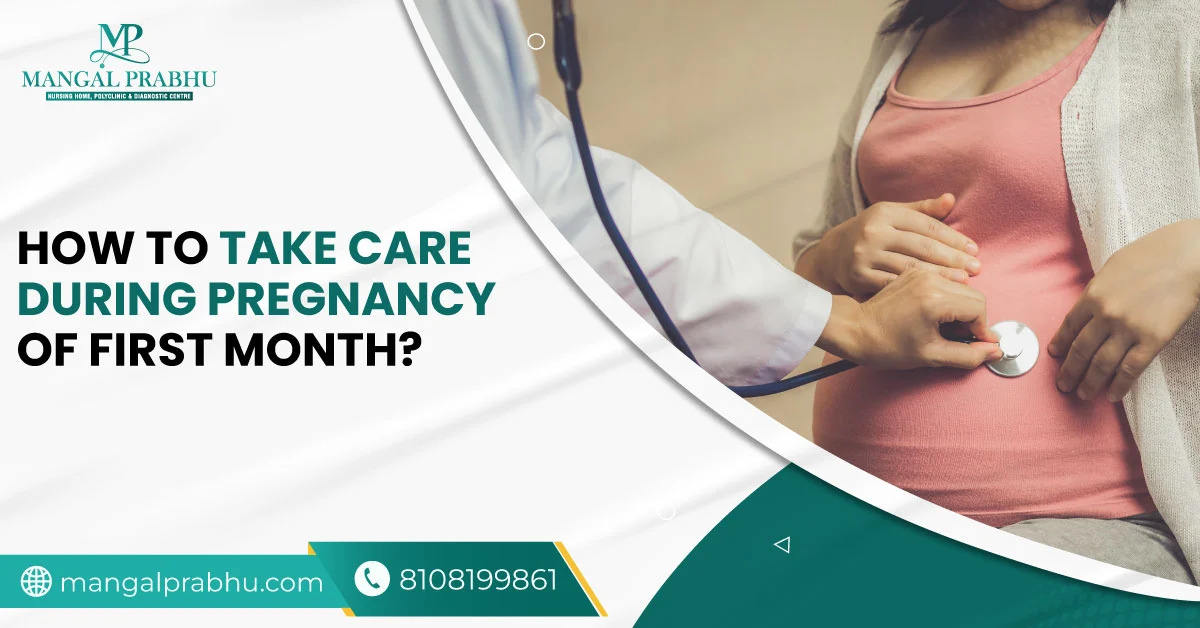
How to Take Care During Pregnancy of First Month?
Exciting news! You’re embarking on a journey of a pregnancy. As you start experiencing early signs like fatigue, nausea, vomiting, and sore breasts, it’s important to remember that the first trimester can be a rollercoaster. To ensure a smooth ride, consider visiting a pregnancy hospital in Navi Mumbai and consulting with the best gynecologist.
These tips will help you navigate the first trimester.
Healthy Lifestyle Choices
Watch your diet. Remember, your body needs only 300 extra calories in the initial stage of pregnancy, so you don’t have to eat for two. The food quality, however, plays a significant role in keeping you and the little one healthy. Add healthy snacks, protein, vitamins, and other nutrients to your diet.
Exercise is a great way to stay active and healthy. But don’t overdo it. Talk to your gynecologist before practicing any exercise, just to be on the safe side.
Prenatal Vitamins and Supplements
The first trimester of pregnancy lasts for 13 weeks. During this period, you are supposed to take prenatal vitamins to ensure proper fetal development. This includes 400 micrograms of folic acid daily. Your doctor will also recommend calcium, iron, and zinc supplements, which might last throughout your pregnancy.
Remember the Don’ts of the First Trimester
Alcohol, cigarettes, and tobacco should be totally avoided before and during pregnancy. You must also steer clear of excess coffee and other caffeine-rich foods, as well as unripe papaya and pineapple. Additionally, your gynec will advise you against eating the raw and undercooked meat. It increases your risk of contracting listeria and salmonella, which can cause miscarriage, premature birth, and severe birth defects in your baby.
Get Screenings
Prenatal care is important at every stage of pregnancy. Since the first few months are the most critical, you must consult a qualified gynecologist and obstetrician in Navi Mumbai every month or as frequently as they advise.
Your doctor will order blood work, urinalysis, and an ultrasound in the first month. These are done to evaluate your and the fetal health. The first-trimester ultrasound shows your baby’s heartbeat, estimated due date according to the fetal growth, and whether your pregnancy is progressing well.
Manage Pregnancy Symptoms
The first trimester is the hardest for most women. A surge in your estrogen combined with the pregnancy hormone Human Chorionic Gonadotropin can take a toll on your mental and physical health. Coping with the physical symptoms can be exhausting. These symptoms occur because of the development of the magical organ “placenta,” which is responsible for providing nourishment to the fetus. Hopefully, they will subside in the third or fourth month.
Your gynec will prescribe medication for nausea, vomiting, and other symptoms. Try to rest as much as possible. Surround yourself with positive people and stay hydrated.
Conclusion
It’s not just the physical symptoms that can be challenging, but the emotional changes due to the sudden rise in hormone levels are equally difficult. To stay healthy during pregnancy, stay active, eat a healthy diet, take your prenatal vitamins, and practice exercise and meditation.
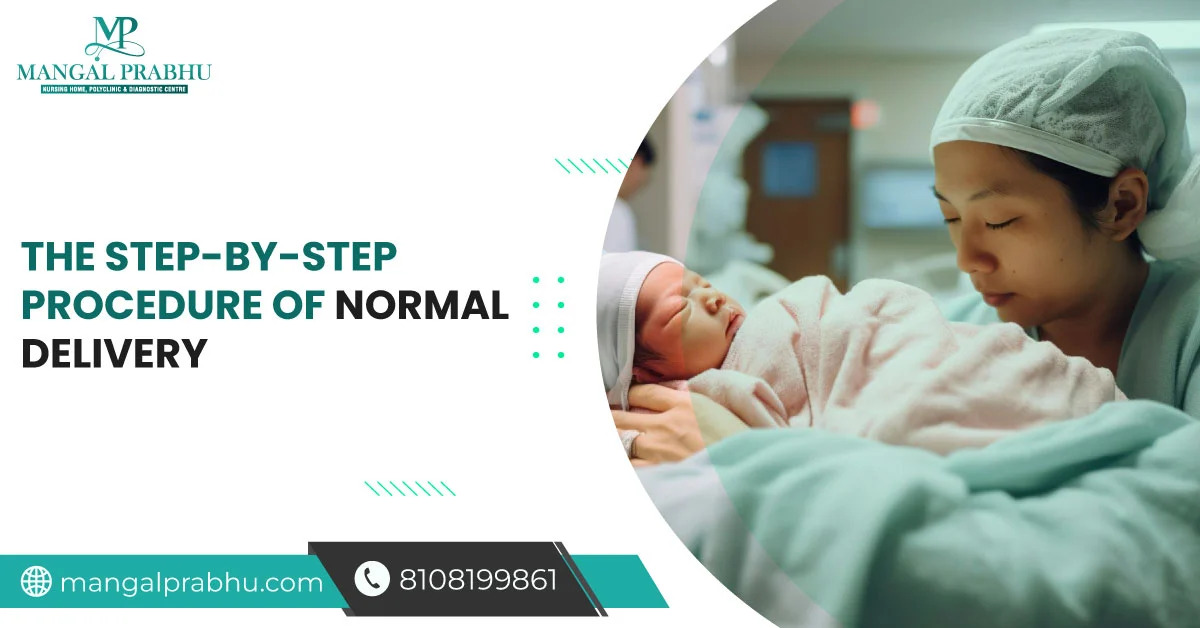
The Step-By-Step Procedure of Normal Delivery
1. Introduction
Women can enjoy motherhood as an unbelievable moment that challenges what you thought or realized during the entire nine months of pregnancy and forever changes the life of your baby and yourself. The best doctor for normal delivery in Navi Mumbai at Mangal Prabhu Hospital, uses the natural process of birth in which a baby is born through the birth canal without the required surgical measures being undertaken. Thus, this guide will help you to understand the detailed processes of normal delivery.
2. What is Normal Delivery?
Vaginal birth is a normal phenomenon that entails the dilation of the cervix through the birth canal until the mother delivers the baby. It gives the most advantage when the mother and baby are both healthy and do not require a cesarean part unless the mother or baby faces complications based on unforeseen occurrences.
3. The Step-By-Step Procedure of Normal Delivery:
3.1. Pre-Labor Signs
The labor may begin with some signs of the pre-labour period that show the body has already started preparation for the delivery.
- Lightening: The baby lessons the birth canal in preparation for labor
- Braxton Hicks contractions: It is a sort of irregular and soft-kick.
- Cervical changes: The opening begins to soften, thin out, and dilate.
- Mucus plug discharge: The loss of the mucus plug, the kind of plug that seals the cervical opening during pregnancy.
3.2. Labor Contractions
Actual labor begins with regular and more intense contractions at regular intervals. These contractions serve to mitigate cervix dilatation and lower the baby’s positioning in the pelvic cavity.
- Early Labor: Contractions can remain mild and irregular, lasting for 30-45 seconds occasionally, unless they occur on average every 5-30 minutes.
- Active Labor: Contractions will get stronger, and while you’ll activate, it lasts for about 40-60 seconds that will end with a 3-5 minute break.
- Transition Phase: Dilation extends to the cervix completely. The contractions lasted approximately 60-90 seconds with an inter-contraction interval of 2-2.5 minutes.
3.3. Delivery Process
As soon as the cervix stretches up to its full thickness, the labor starts.
- Pushing: The baby slips into the birth canal with the help of the abdominal muscles after contraction.
- Crowning: At the time of delivery for a woman, the baby’s head becomes visible on the vaginal orifice.
- Birth: At last, a little skull and the neck of the baby in the mom’s lap appear, the shoulders and the body succeeding them over time.
3.4. Post-Labor Care
Post-labour care includes:
- Delivery of the Placenta: The placenta could be removed by the doctor through the birth canal shortly after the baby’s delivery.
- Mother’s Recovery: The mother may not go through the examination just for the postpartum complications, but she is in pain when there are cuts or stitches during the episiotomy.
- Newborn Care: Then the doctor measures, dries up, and places the newborn on the mother’s breast, and the mother starts milk feeding.
4. Conclusion
The normal delivery process is a complex but natural event that involves several stages. Mothers-to-be must be up-to-date with the respective stages of labor, and they have to collaborate with the best Maternity Hospital in Navi Mumbai, like Mangal Prabhu Hospital, to guarantee a straightforward delivery with the minimum risks for mother and baby.
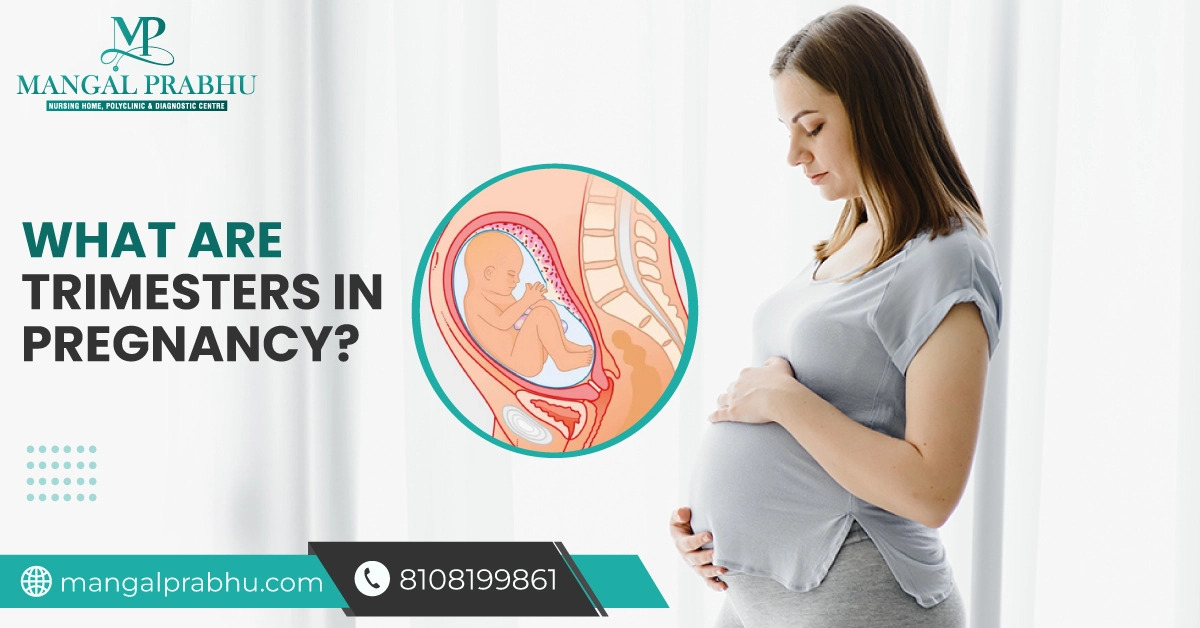
What are Trimesters in Pregnancy?
What are Trimesters in Pregnancy?
Trimester is a journey of pregnancy. The concept of trimesters acts as a way to guide through the changes and growth in pregnancy. It is the ninth month of the journey, which is divided into three phases, each lasting for three months. If you are looking for a place to help you through trimesters, then you should visit Mangal Prabhu Hospital.
What Happens During Each Trimester?
i) The First Trimester
The first trimester starts from idea to week 12. In that time, an inspiring transformation takes place wherein a fertilized egg implants itself into the uterine lining, constantly dividing and forming the embryo. In this era, the primary organs and structures start to develop in infants.
ii) The Second Trimester
This continues after the first trimester, which is from the 13th week to 27 weeks. The second trimester brings a sense of remedy to maximum moms as early signs and symptoms of being pregnant, like vomiting, lessen. There is a massive change that is visible, such as the visibility of the baby’s bump. Energy levels in women typically increase, and they often experience a newfound sense of vitality.
iii) The Third Trimester
The third trimester is the last. It lasts from week 28 until birth; during the third trimester, the mother goes through remarkable changes. The baby gains weight in this period, due to which the mother may face little discomfort in her organs and joints due to the pressure of the baby.
Also Read: When to Consult a Doctor During Pregnancy?
Common Symptoms and Changes During Each Trimester
Every trimester has its significant changes and symptoms. For example, fatigue, morning sickness, and breast tenderness are common in the first trimester, whereas heartburn, back pain and swelling may arise later on.
Tips for Maintaining a Healthy Pregnancy During Each Trimester
Regularly taking a look at healthcare carriers and heading off harmful substances like tobacco, alcohol, and junk meals are important and also vital for a wholesome pregnancy. It is essential to have healthy and balanced nutritious food, work often, stay hydrated and get the proper treatment for the baby to be wholesome. Pregnancy Care Hospital in Navi Mumbai Provides a healthy diet and a suitable amount of food that a mother should take; they also provide healthcare for mothers. Pregnancy Care Hospital in Navi Mumbai Provides a healthy diet and a suitable amount of food that a mother should take; they also provide healthcare for mothers.
Preparing For labor and Delivery in Each Trimester
As the date of delivery comes closer, it is important to be prepared for the delivery and labor. This involves creating a birth plan, attending childbirth classes and grasping pain management techniques. You should visit an Obstetrician in Navi Mumbai as they provide labor and proper planning for the delivery of the baby.
Conclusion
Trimesters in pregnancy show a pathway for excited mothers to understand and go correctly through this transformative journey of bringing new life into the world. Mangal Prabhu Hospital Treats and gives a healthy pregnancy plan to the mothers. Each phase of the trimester brings joy and challenges for the mother. By having healthy pregnancy plans and self-care, women can go on this journey with confidence.

Celebrate Motherhood with Our Special Maternity Care and Delivery Package Offer!
Are you excited? It’s a feeling of excitement as you get ready the welcome of a new family member to your family. We at Mangal Prabhu Hospital, we recognize the significance of this moment and try for to create a journey that is memorable and enjoyable as we can.
We are pleased to announce the exclusive Stree Sehat Abhiyan service which is a unique maternity care and delivery package that is designed to provide you with peace of mind through this crucial period in your journey. Our aim is to provide excellent care, without the expense of excessive hospital expenses.
When you make your delivery registered with us now you will gain access to a wealth of advantages:
- The ANC Checkup and ANC Profile: A regular antenatal checkup is vital to ensure an uninvolved pregnancy. Benefit from our free ANC checkup and profile to check your health as well as that of your baby.
- Prices at Specially Discounted on Deliveries Packages: Our belief is that the best medical care for pregnant women should be available to everyone. Get special offers on all of our delivery services, specifically designed to meet your individual requirements.
- Free Consultation with a Gynecologist: Our expert gynecologists in navi mumbai are available to answer any questions that you may have. You can avail a consultation for free in which you can discuss pregnancy concerns, birth preferences and postnatal treatment.
- CBC & TT Injection: Your health and security are our top priority. Get the vital CBC tests as well as TT injections as part of our complete maternity health package.
Deliveries starting at just the price of Rs. 28,125, there’s not the right time to get started on this amazing trip with us. However, hurry up – this offer is only valid from the 1st march to 31st march 2024.
Don’t let financial concerns overshadow the joy of expecting a baby. Rely on Mangal Prabhu Hospital to provide the support and care you need, at every step of the process. Make an appointment today to feel the benefits!

Difference Between Gynecologist and Obstetrician
I. Introduction
Women’s reproductive health is like the conductor orchestrating their participation in the workforce. Reproductive health services are the catalysts propelling women towards empowerment and providing healthy and safe well-being. In the grand journey into the realm of women’s health, an individual needs to unravel the intricacies of the contributed trio: OB/GYN, obstetrics, and gynecology. Although the terms might sound like a medical alphabet jumble, each holds a unique role in addressing the varied health needs of women. Get ready for an immersive journey into the domains of welcoming new life and safeguarding the enduring reproductive health of women with the best Maternity Hospital in Navi Mumbai like Mangal Prabhu Hospital.
II. What is a Gynecologist?
Gynecologists emerge from their educational crucible with a keen sense of preventive care, diagnostic skills, and the power to combat reproductive disorders like cancers and pelvic perils. Armed with an arsenal of knowledge on family planning and contraception, they’re the trusty sidekicks ensuring women’s reproductive well-being through every twist and turn. They are warriors against issues like irregular menstruation, infections, cancers, and a plethora of other reproductive challenges. Regular screenings and timely interventions with gynecologists ensure that potential threats are detected early, boosting the chances of triumphant recovery.
III. What is an Obstetrician?
With a similar origin story of education and residency, these conductors specialize in the spectacle of pregnancy and childbirth. They empower women to make informed choices, orchestrating the symphony of when and how to expand their families. Obstetricians dazzle in the realm of high-stakes pregnancies, fetal crescendos, and the dramatic outcome of childbirth. But their role doesn’t stop there; they continue the postpartum encore, ensuring the well-being of both mother and newborn.
Also Read: When to Consult a Doctor During Pregnancy?
IV. Similarities and Differences
Both gynecologists and obstetricians join forces in championing the cause of regular check-ups. Gynecologists mostly provide treatment for various reproductive issues and allow routine screenings, while obstetricians emphasize the importance of prenatal harmonies for the health of both mother and baby. Both specializations help ensure women stay in sync with their bodies at every stage. This dynamic duo ensures that women receive the specialized care they deserve, adapting their powers to the unique needs of each stage. In cases of complications, both specializations team-up becomes even more pronounced for their patients.
V. When to See a Gynecologist vs. Obstetrician
When you suffer from any reproductive systems enigmas, such as ovarian conundrums, uterine puzzles, endometriosis mysteries, menstrual issues, or sexual health, or you need consultation for contraceptives, then find solutions with a Gynecologist in Navi Mumbai at Mangal Prabhu Hospital. For those venturing into fertility expeditions or seeking assistance with family planning strategies, postpartum pampering, labor, and delivery, your obstetrician is the guide offering evaluations, fertility treatments, and a roadmap to your desired destination.
VI. Conclusion
By understanding the nuances of their roles, women can embark on a proactive journey towards well-being, armed with knowledge and help in taking steps to manage their reproductive health at every stage of life. Whether it’s a gynecological escapade or an obstetrical odyssey, rest assured that these healthcare providers stand ready to empower and uplift every woman, turning each chapter into a tale of triumph and resilience.
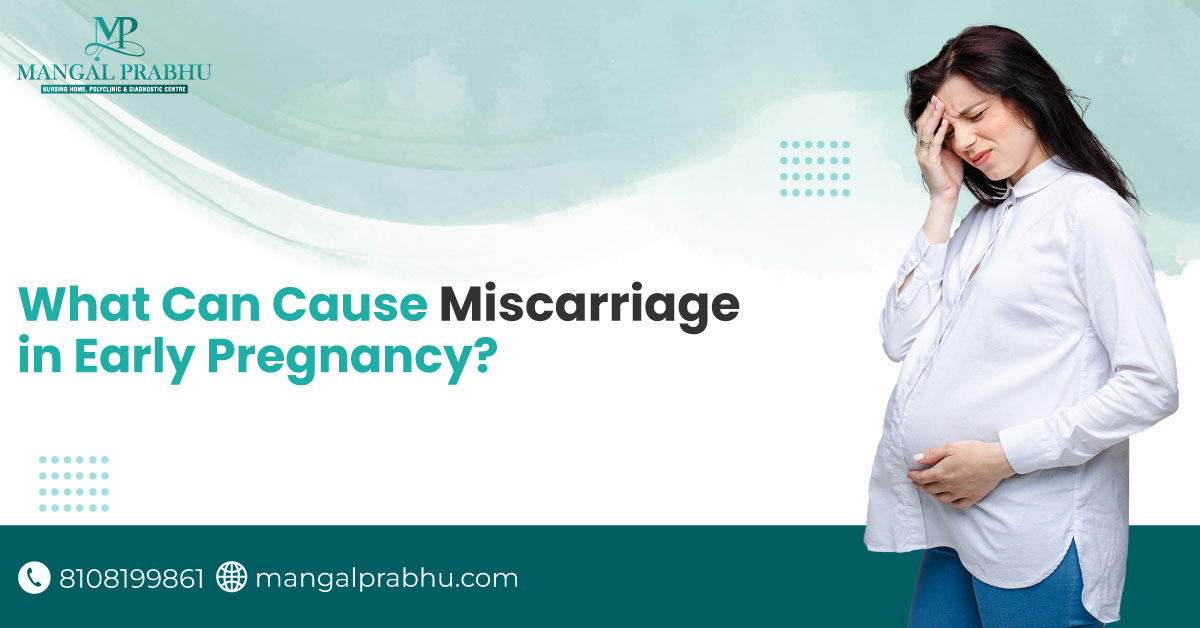
What Can Cause Miscarriage in Early Pregnancy?
Definition of Miscarriage:
It refers to the loss of a pregnancy before the 20th week. It can be a challenging and emotionally taxing experience for couples hoping to start or expand their families. Seeking support from a specialized Pregnancy Care Hospital in Navi Mumbai, such as Mangal Prabhu Hospital, becomes crucial during such delicate times. The compassionate care and guidance provided by experienced professionals in these dedicated healthcare facilities can aid couples in navigating the emotional and physical aspects of miscarriage.
What Causes Miscarriage in Early Pregnancy
A) Genetic Abnormalities:
The majority of early pregnancy miscarriages are attributed to genetic abnormalities in the developing embryo or fetus. These abnormalities disrupt the normal progression of pregnancy, hindering its viability.
B) Hormonal Imbalances:
Maintaining a healthy pregnancy relies on intricate hormonal balance. Disruptions in these hormonal levels can impede the normal development of the embryo, increasing the risk of miscarriage.
C) Infections:
Certain infections, whether bacterial or viral, directly threaten the developing fetus. It can compromise fetal health and contribute to the occurrence of miscarriage.
D) Structural Abnormalities:
Issues within the uterus or cervix’s structure can disrupt the embryo’s proper development. Structural abnormalities create challenges for the embryo to implant and thrive, potentially leading to miscarriage.
Also Read: A Guide To Having A Healthy Pregnancy: Essential Antenatal Advice For Mothers
Risk Factors
- Age: Advanced maternal age, especially over 35, increases the risk of miscarriage. Similarly, very young maternal age can also be a factor.
- Health Conditions: Pre-existing health conditions like diabetes, autoimmune disorders, or thyroid problems may elevate the risk.
- Use of Drugs or Alcohol: Substance abuse, including the use of tobacco, alcohol, or illicit drugs, can significantly increase the likelihood of miscarriage.
- Exposure to Certain Environmental Factors: Prolonged exposure to environmental hazards, such as radiation or toxic chemicals, may contribute to miscarriage.
Signs and Symptoms
1) Vaginal Bleeding:
One of the most common signs of a miscarriage is vaginal bleeding. While not all bleeding leads to a miscarriage, it is a concerning symptom that requires immediate medical attention.
2) Abdominal Pain:
Persistent abdominal pain, especially if accompanied by cramping, may indicate a potential miscarriage.
3) Back Pain:
Back pain, particularly in the lower back, can be a symptom of miscarriage. It is essential to consult with an obstetrician in Navi Mumbai, such as those at Mangal Prabhu Hospital, if experiencing such symptoms.
Prevention
i) Healthy Habits:
Adopting a healthy lifestyle, including a balanced diet, regular exercise, and avoiding harmful substances, can contribute to a healthier pregnancy.
ii) Regular Prenatal Care:
Early and consistent prenatal care is crucial for monitoring the health of both the mother and the developing fetus. Visiting a pregnancy care hospital, like Mangal Prabhu Hospital, ensures proper guidance and monitoring.
Conclusion
While not all miscarriages can be prevented, understanding the causes, risk factors, and signs can empower expectant parents to make informed decisions and seek timely medical attention. Consulting with a knowledgeable obstetrician in Navi Mumbai and prioritizing regular prenatal care are essential steps toward promoting a healthy and successful pregnancy journey. Miscarriage is a complex and emotionally sensitive topic, and support from healthcare professionals and loved ones plays a pivotal role in navigating through such challenging times.
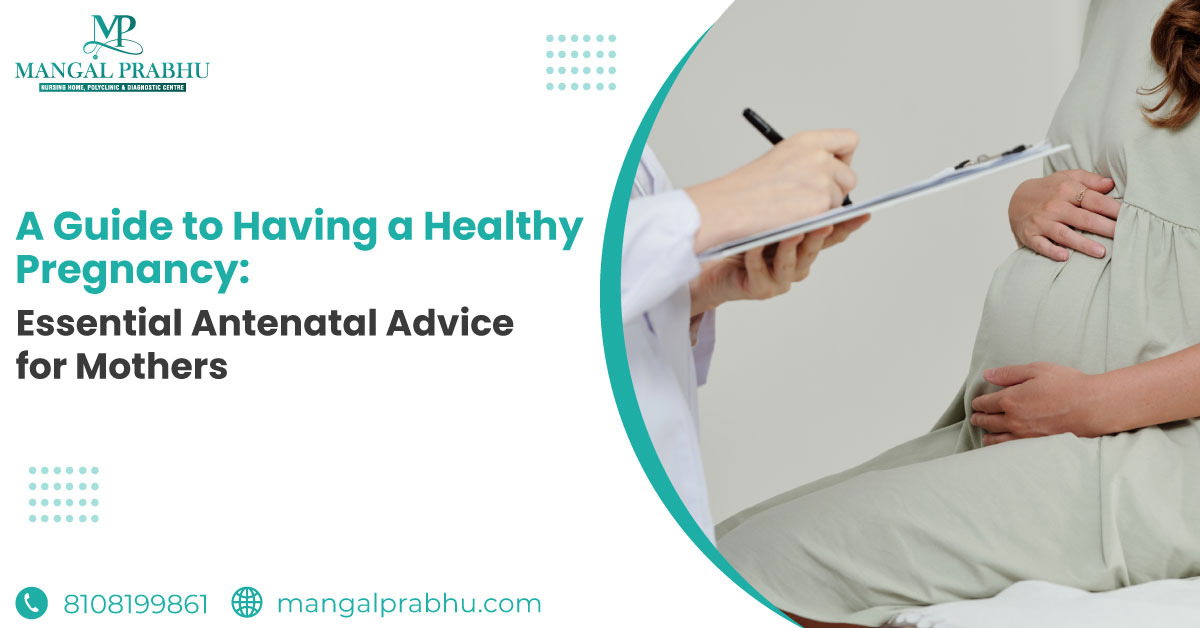
A Guide to Having a Healthy Pregnancy: Essential Antenatal Advice for Mothers
The two positive lines on the pregnancy test are one of the best feelings for parents. As exciting as this phase is, pregnancy can bring a unique set of challenges. With everyone giving you different advice, it’s difficult to know who to follow. It’s important to see your obstetrician in Navi Mumbai immediately if your pregnancy test is positive. They will prescribe folic supplements (if you aren’t already taking them) and nutrition tips to keep the mother and the baby healthy. In the meantime, let’s see how you can prepare yourself for pregnancy.
Preconception Health: What You Need to Know Before You Get Pregnant
If you are planning a pregnancy, your healthcare provider will discuss your medical condition, any complications in previous pregnancies, any medication you are currently taking, and your family history of medical issues to rule out the possibility of any complications in conceiving. You should start 400mg of folic supplements right away.
You also need to stop the consumption of alcohol, drugs, and smoking to prevent the risk of pre-term birth, stillbirth, or miscarriage. Starting a healthy lifestyle with a balanced diet and regular exercising is key to maintaining a healthy weight for pregnancy.
Nutrition During Pregnancy
The calorie count for the day increases as your pregnancy progresses. Ideally, your body needs 300 extra calories daily to meet your baby’s growth requirement. You should get it from protein, vegetables, fruits, and other healthy foods. Cut down on sweets, junk food, and other unhealthy foods that offer little to no nutrition. Here’s what to include in your pregnancy diet:
- Green leafy vegetables and fruits
- Fat-free dairy items
- Foods rich in vitamins and omega-3 fatty acids, like fish
- Lamb, fish, beans, and other sources of protein
Also Read: What Is A High-risk Pregnancy?
Common Pregnancy Complications and How to Manage Them
Pregnancy complications can occur in any phase of your pregnancy. In the first trimester, there’s an increased risk of ectopic pregnancy or miscarriage due to genetic defects or a medical condition.
Later in your pregnancy, you should get screened for gestational diabetes and hypertension. Anemia is also a common problem in women during the second trimester. If you notice any unusual symptoms during pregnancy, reach out to your obstetrician immediately to prevent further complications.
Preparing for Labor and Delivery
A pregnancy care hospital in Navi Mumbai recommends you take antenatal classes to learn about labor and prepare your body for it as early as possible. Talk to your gynecologist about the exercises during pregnancy.
You will start with walking, swimming, and basic exercises in the first trimester. As your pregnancy progresses, your healthcare provider will recommend strength training and exercises that can help during labor.
Postpartum Care
The first few weeks after delivery are crucial for the mother’s health. With the responsibility of a newborn, the mothers sometimes forget they have delivered a baby. Your body needs rest and time to heal. Eat well and avoid heavy lifting, climbing stairs often, etc. Practice mild exercises, as recommended by your obstetrician, and keep the stressors away.
